Since the collapse of the Montreal Canadiens’ 2017-18 NHL season, general manager (GM) Marc Bergevin has been working on a retool. The Canadiens have focused on building a younger, faster team that frames better in an NHL that has been trending in that direction for several seasons.
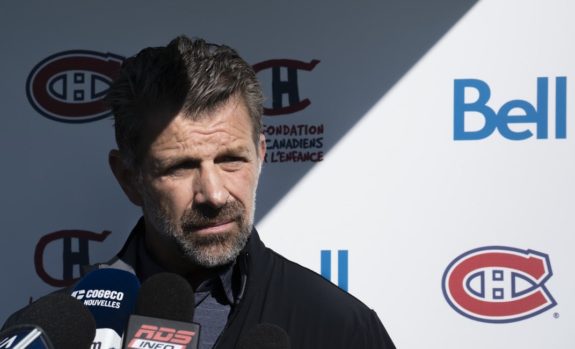
Despite improvements to the NHL roster making the team more competitive and exciting to watch, there have been no playoff games, nor does the 2019-20 season look like it will be adding any either.
Building Blocks
Bergevin has made a concerted effort since that season of collapse to add a plethora of draft picks for assistant GM Trevor Timmins to use at the draft table. Timmins had access to 21 draft picks in the last two NHL drafts, and the Canadiens (as of Jan. 27) hold 11 more picks in 2020.
The draft is an excellent foundation to help build a franchise — it is the basic foundation of every Stanley Cup champion in the cap era. However, it takes more than just Timmins drafting well.
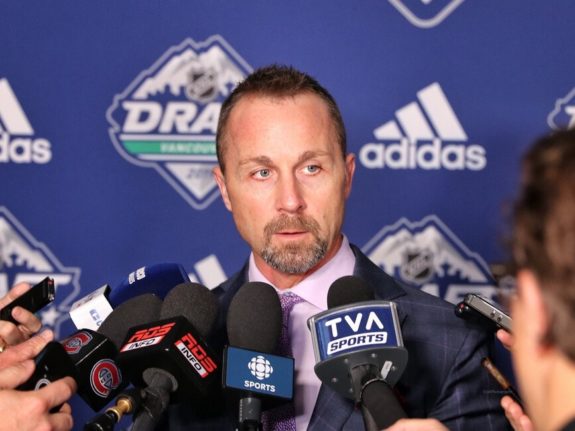
The next step is to develop these young players into NHL-capable players who can meet their full potentials. That is done in many ways. European prospects can be left to mature with their club teams, junior-aged North Americans can be left with their CHL teams or to complete in up to four seasons in the NCAA.
But what happens when 20 to 30 prospects arrive at development camp ready to enter the professional ranks? Obviously, the NHL limit of 50 contracts will weed out many young players, but two-way American Hockey League/ECHL contracts do not count towards that limit, allowing them to help ice competitive minor league teams. This brings up the issue of ice time for development.
A Two-Tiered Minor League System
To become a contender, an NHL franchise needs to have a farm system that routinely graduates NHL-caliber players. The Canadiens haven’t been able to do so during Bergevin’s tenure.
Last season, the AHL’s Laval Rocket had 46 different players on their team; this level of roster turnover is high considering how healthy the Canadiens were that season. Ice time to a prospect is like sunlight to a plant: not having enough can slow the growth and can also prevent them from reaching their full potential. This highlights the importance of having another development level.
This is where adding an ECHL affiliate to provide another level of development is paramount in progressing their prospects. Owning their own affiliate, ideally as close to Montreal as possible, would allow the organization to have direct control of the development of young players. It would also ensure that those prospects are playing the systems the Canadiens employ, allowing a more seamless transition when graduating players.
Currently, Montreal has no ECHL affiliate and this is causing problems as they shuttle some players from one team to the next in the hopes that they receive ice time. Goaltender Michael McNiven is a perfect example of this.
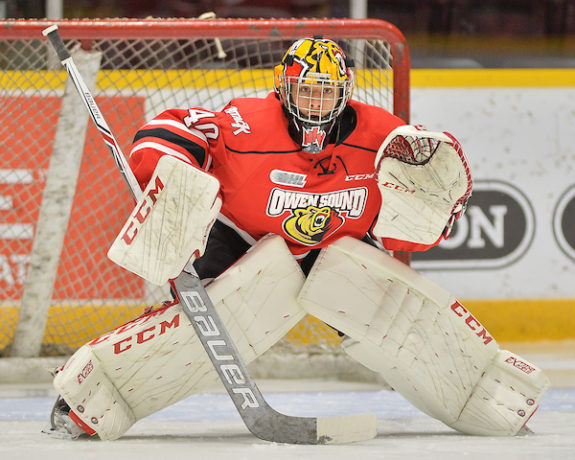
Keith Kinkaid’s addition as the NHL backup caused a ripple effect in the organization. It left Cayden Primeau and Charlie Lindgren as the AHL tandem (until Kinkaid and Lindgren swapped roles), forcing McNiven to be loaned to various ECHL teams. He has been loaned to three different ECHL teams so far, playing a total 19 games and is moved aside when the parent clubs of these teams want their own goaltending prospects getting more playing time.
This is why the news of a new arena being built in Trois-Rivières, only 150 kilometers away from Montreal was seen as an ideal opportunity to regain control of their developmental system.
Keeping up With the Joneses?
The Canadiens modernizing their development system would allow the team to keep pace with divisional rivals such as the Toronto Maple Leafs, Detroit Red Wings and Ottawa Senators, who are in various stages of rebuilds and contention. Adding a second tier in their farm system could provide not only control of their development process, but also satisfy the demands of their local market in giving local Quebec-born players a path to the NHL.
Signing undrafted Quebecois players provides good relations with the francophone community. It can also give a late bloomer a chance at making the NHL as a productive player. Players such as David Desharnais and Jonathan Marchessault are examples of undrafted locals who were able to develop into NHL players.
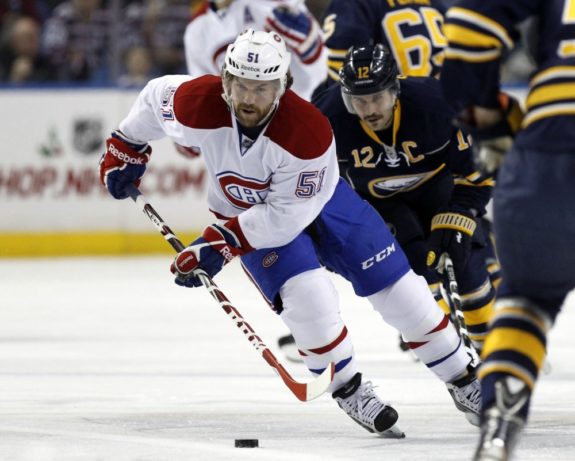
Another issue the Canadiens have to deal with, albeit self-imposed, is the language issue. The necessity to hire French-speaking coaches and managers for this franchise creates a need to develop as many candidates as possible as the Habs are never able to hire the best possible candidate but only the best possible bilingual candidate. Having a development path for new coaches can only benefit Montreal in the long run by adding more candidates to choose from.
In this new salary cap era, there are still no ceilings placed on how much a team can spend on anything outside of player salaries. So far they have been adding more scouting staff and funding their own scouting combines, all helpful in drafting, but a franchise as wealthy as the Canadiens need to take advantage of this loophole in the Collective Bargaining Agreement and start spending on their development system.
The Trois-Rivières Saga
Mayor Jean Lamarche claims to have received conflicting reports from the Canadiens. The one and only publicly stated position from the Canadiens is that of vice president (VP) of hockey operations John Sedgwick (translated from French):
“the Canadiens are willing to commit to becoming the principal associate for an ECHL franchise in Trois-Rivières”
from, Colisée de Trois-Rivières: le Canadien revient à la charge | Actualités | Le Nouvelliste – Trois-Rivières by Gabriel Deslile 17 January 2020
However, in that same article, Mayor Lamarche claimed that in further conversations, Canadiens VP of commercial affairs France Bélanger stated to him that the Habs wanted no affiliation with Dean Macdonald (owner of the NFLD Growlers)
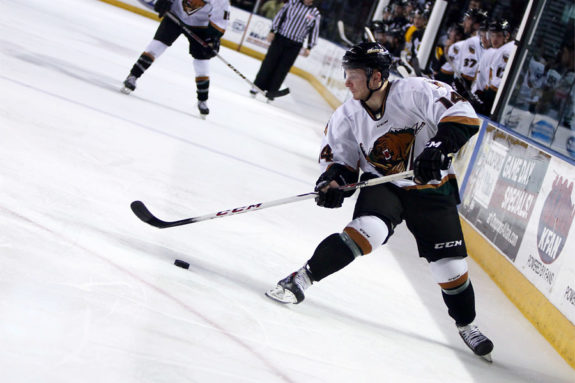
These conflicting claims forced the Canadiens’ hand to reaffirm their position of a desire to form a franchise in Trois-Rivières. This has strengthened the city’s leverage; however, it would seem the Usport bid by Université de Quebec – Trois-Rivières (UQTR) is now the frontrunner to be the main tenant. No doubt, a PR nightmare for the Quebec hockey powerhouse Canadiens.
It would seem the desire of the mayor is to have UQTR as the only tenant. For a city that doesn’t want to pay subsidies to prop up the management of their new arena, making a Usports team the principle tenant that attracts up to 500 spectators per game with a season of only 14 home games while completely excluding a professional franchise supported by the area’s richest hockey franchise that also happens to own a major entertainment group that can add concert dates, makes little financial sense.
Where to Now?
The last ECHL affiliation the Canadiens organization held was with the Brampton Beast, yet it was a shared affiliation with the Ottawa Senators. Obviously, not an ideal situation, but one that was better than spending the last two seasons without any affiliation.
Fans won’t need to go far to see an example to emulate, the Maple Leafs organization has built a strong development system that is now bearing fruit as they can graduate NHL-capable players regularly. Another quality example is that of the Senators. They now have full control of the development of their prospects, which is helpful for a team in the midst of a rebuild.
With the option of Trois-Rivières seeming to have been closed, it is time for Bergevin and team owner Geoff Molson to look elsewhere to add that missing piece. The simplest option is to sign an agreement with the only independent team currently in the ECHL, the Norfolk Admirals. While not ideal, as Norfolk is geographically distant, albeit in the same time zone, as well as the fact the team is independently owned, it would provide the Canadiens the affiliate they desperately need. It would be an immediate improvement over having no control on where to place their second tier of prospects. Also, it buys time for the Habs to find a permanent solution.
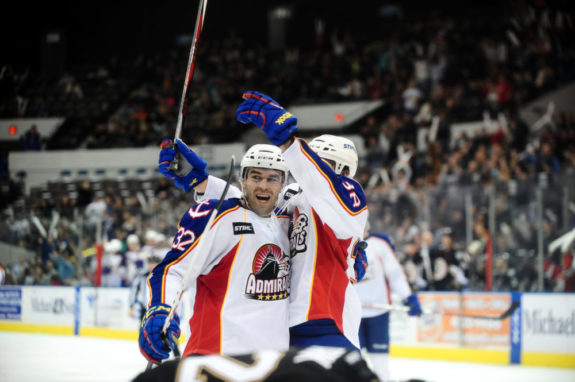
Another option would be to use the Canadiens’ deep pockets to purchase the franchise from its current ownership group led by former Admiral Patrick Cavanagh. Considering that they’re averaging below the league’s average attendance of approximately 4,000 fans per game, buying this team and moving it into Place Bell in Laval, an arena already managed by Molson’s Evenko group, would provide better location, access to coaching and amenities.
Build It and They Will Come
Canadiens fans love their history, and they can look back at the success built by former GM Frank Selke who built the Habs farm system creating the basis for the dynasties of the 1950s, 1960s and 1970s.
This history should point the way ahead for the current management team simply by seeing the benefits that a tiered farm system provided in the past. They need only adapt that system and modernize it for today’s NHL.
Building a multi-layered farm system is not a guarantee to having a Stanley Cup champion in today’s NHL, but not having one can be detrimental to a franchise that is unable to attract top free agents or win a draft lottery.